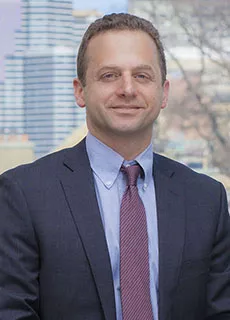
Politics and global connectivity in the COVID-19 crisis
For the past two decades, Edward Schatz’s research has focused on the relationship between society and the state. If there is one point he would emphasize about the current situation, is that all governments worldwide are confronting universal issues that require collaborative efforts on the part of a nation’s policymakers as well as its citizens.
“The truth is that we need global solutions to this really global problem, or at a minimum, we need governments to work in very close concert with other governments,” says Schatz, an associate professor in UTM’s Department of Political Science since 2005.
On the latest edition of the VIEW to the U podcast, Schatz talks about the ways in which the current pandemic has amplified some of the prevalent issues that are problematic no matter what corner of the world you currently call home. He says that one of the things demonstrated most overtly and obviously are health implications because everyone is vulnerable to getting infected by the coronavirus, regardless of its origins and due to the reality that we live in such a globally connected way.

However, another thing that is significantly illuminated in the crisis is the flawed structure of global capitalism and how it ties in with social inequality.
“We know how modern markets work – labour is mobile, global supply chains work reasonably seamlessly, and there is ever-increasing specialization of labour,” says Schatz.
“But other things that the crisis reveals is pervasive inequality, which is hardly news. However, if we think in the context of the pandemic about who has been shouldering the burden disproportionately – doing things like stocking our grocery stores, delivering our packages, caring for the sick, driving people in taxis and so on – it becomes pretty clear that socioeconomic inequality, which is often racialized, is frequently rooted in precarious labour, that all of this plays a huge role and it lies at the heart of this faulty system that has been created across the globe.”
He suggests that a rethinking of the gig economy is necessary because it is only truly functional when business is thriving, not in times when people start to reprioritize purchases based on essentials and the patterns of consumption are shifting dramatically.
Over the years, Schatz’s research has covered a range of topics including identity politics and social transformations, with a particular focus on former Soviet Eurasia. Later this year he has a book coming out called Slow Anti-Americanism, which is based on several years of research around how images of the United States filter into domestic politics and society of the former Soviet space, and how those concepts might change over time.
In March 2020, Schatz received $200,000 in funding from the Social Sciences and Humanities Research Council of Canada for a Partnership Development Grant. He is embarking on this new collaborative project on China’s Belt and Road Initiative and its impact across Eurasia with colleague Professor Rachel Silvey at U of T and collaborators at the National University of Singapore and Nazarbayev University in Kazakhstan.
As a side interest stemming from his work, Schatz also focuses on research methods that examine the value of fieldwork and how knowledge is constructed.
Some of what all his work has demonstrated is how concepts can significantly change over time. In the current unstable situation, he says, it is difficult to say where we land over the next few months with governments changing and a shift in strategies taking place. However, he adds that everyone can do their part to help no matter where we stand politically or where we reside in the world.
“If a person can imagine themselves to be essentially similar to others, in spite of whatever differences there may be – of skin color, or salary, or age, whatever it might be – then they are willing to make sacrifices for the common good,” says Schatz.
“One of the things that makes a huge difference in the context of effective public health responses and in a crisis like this is a strong sense of social solidarity that allows citizens to make some reasonable sacrifices in the face of a society-wide crisis.”
